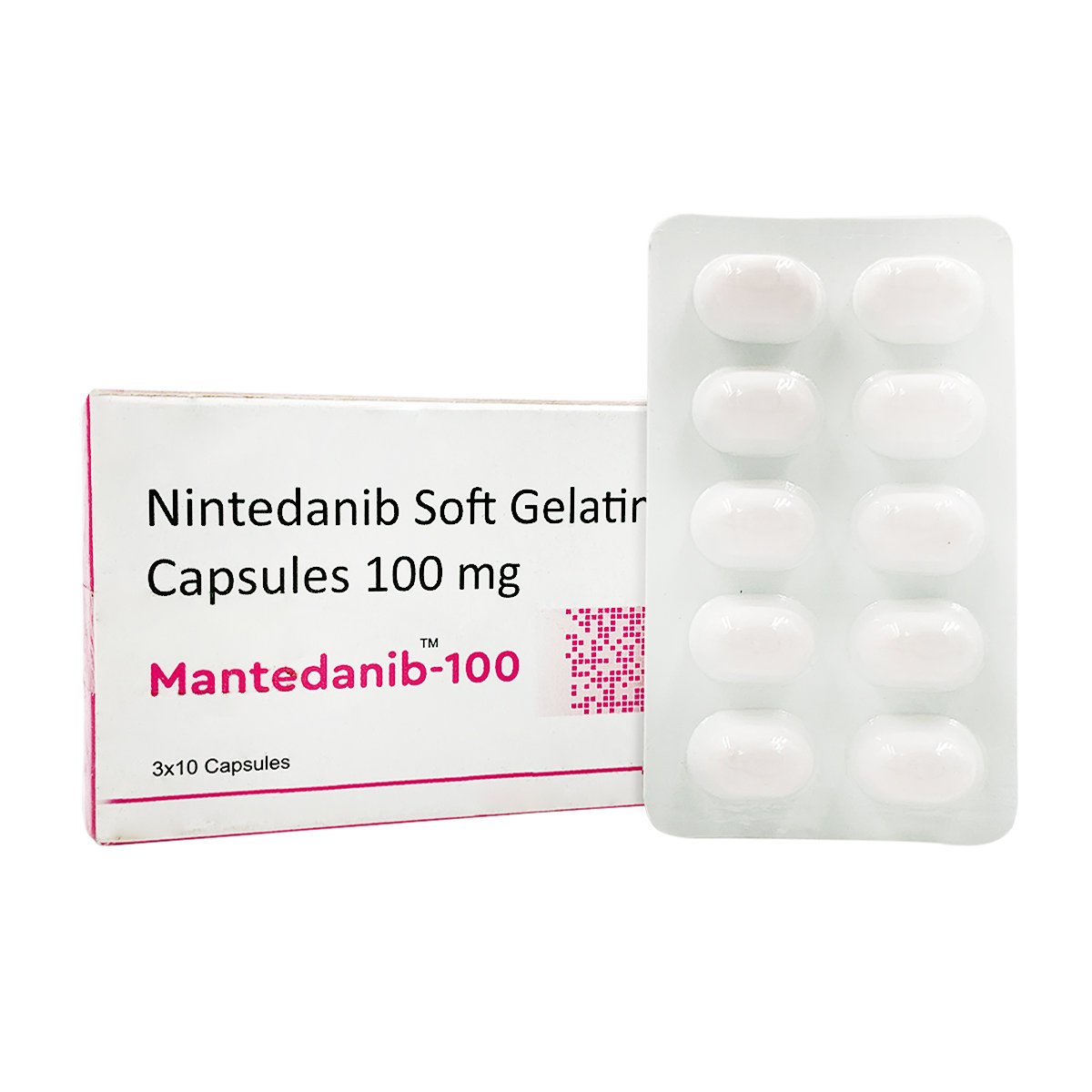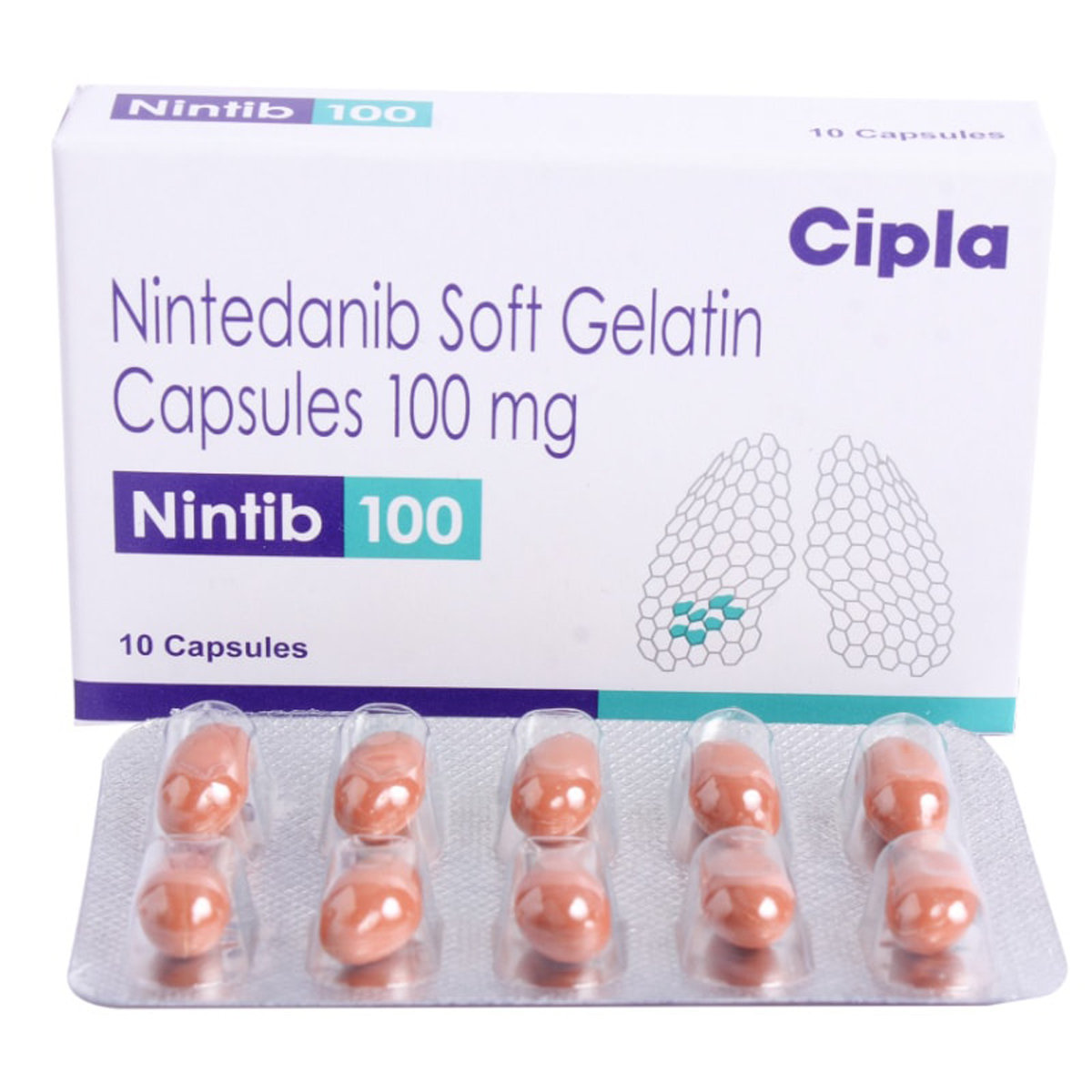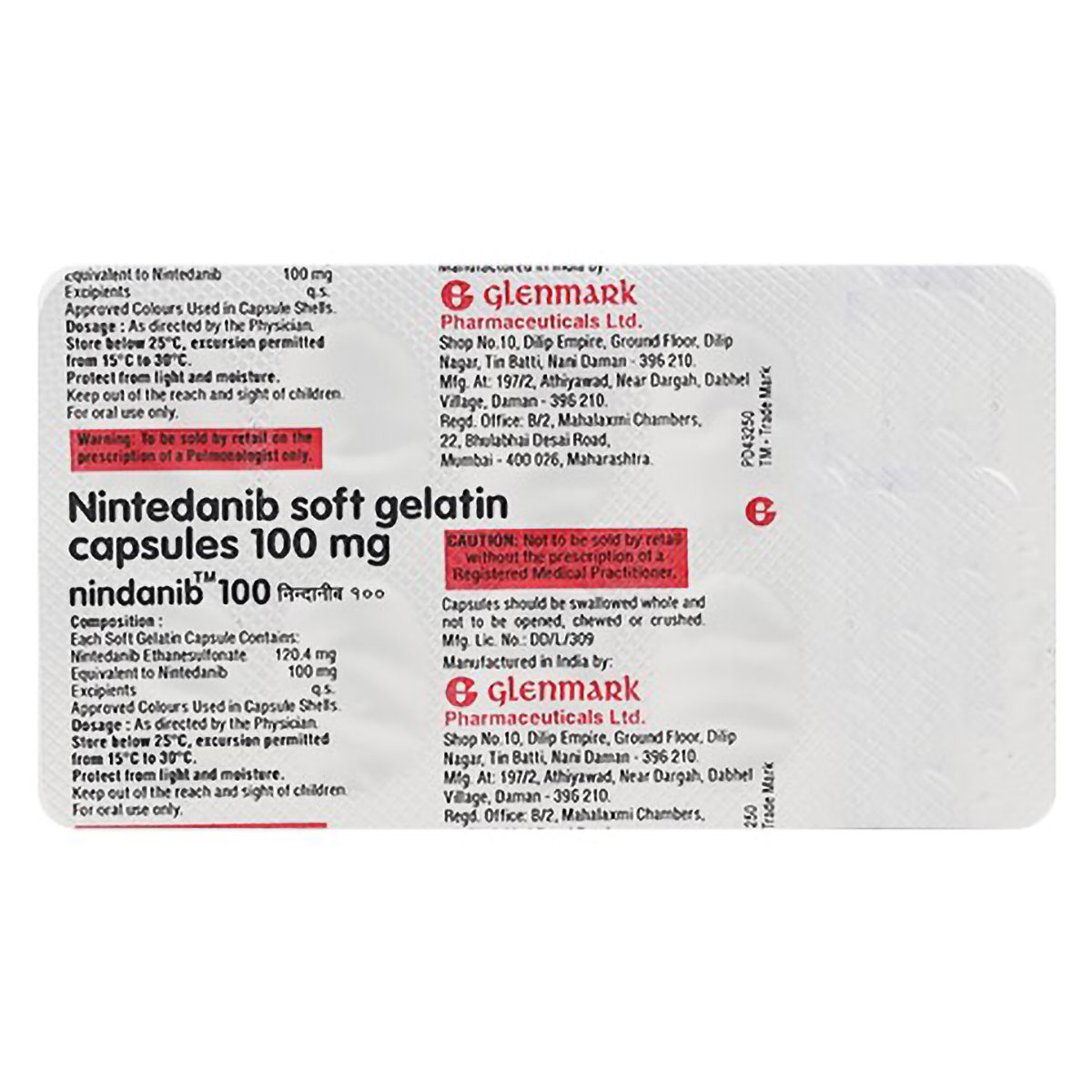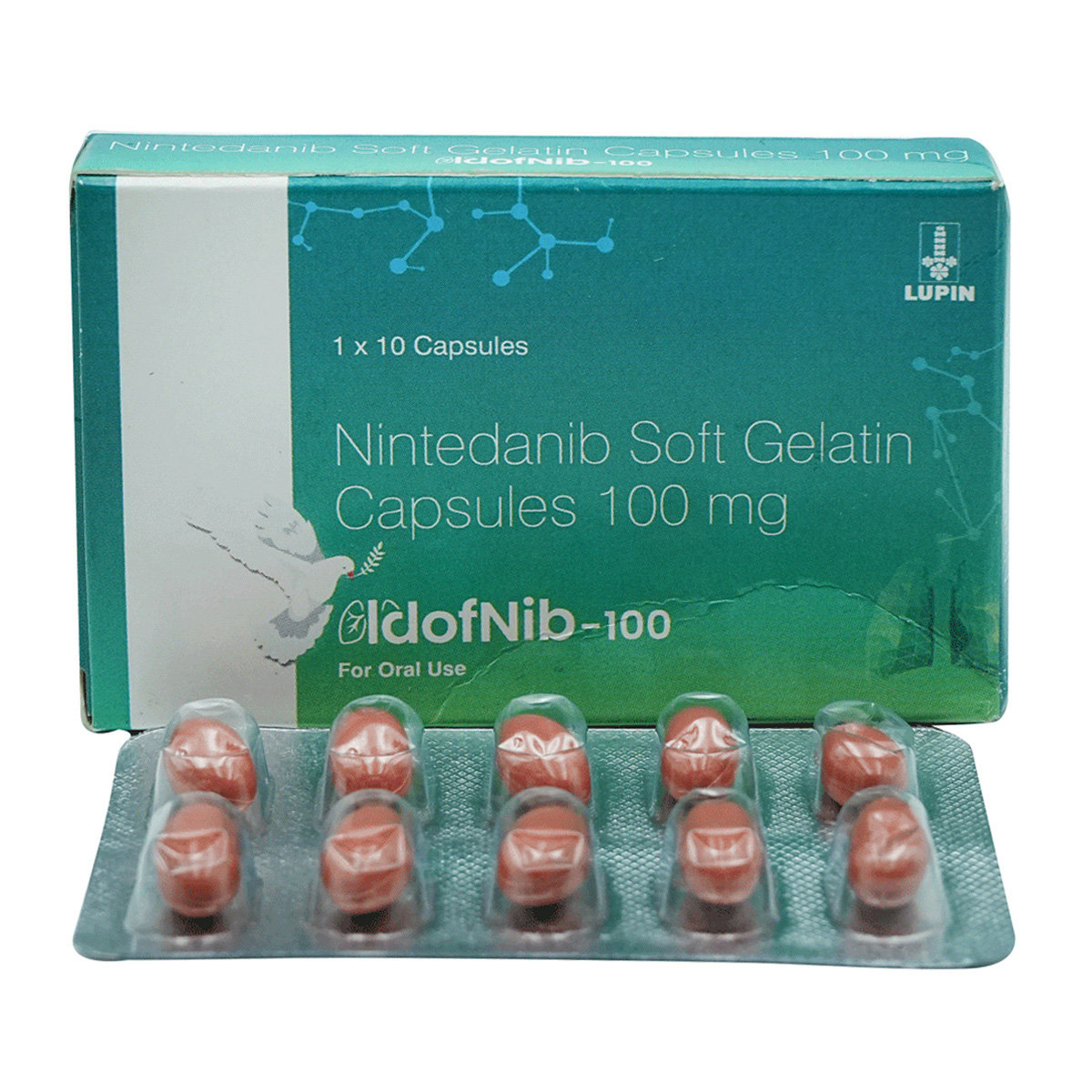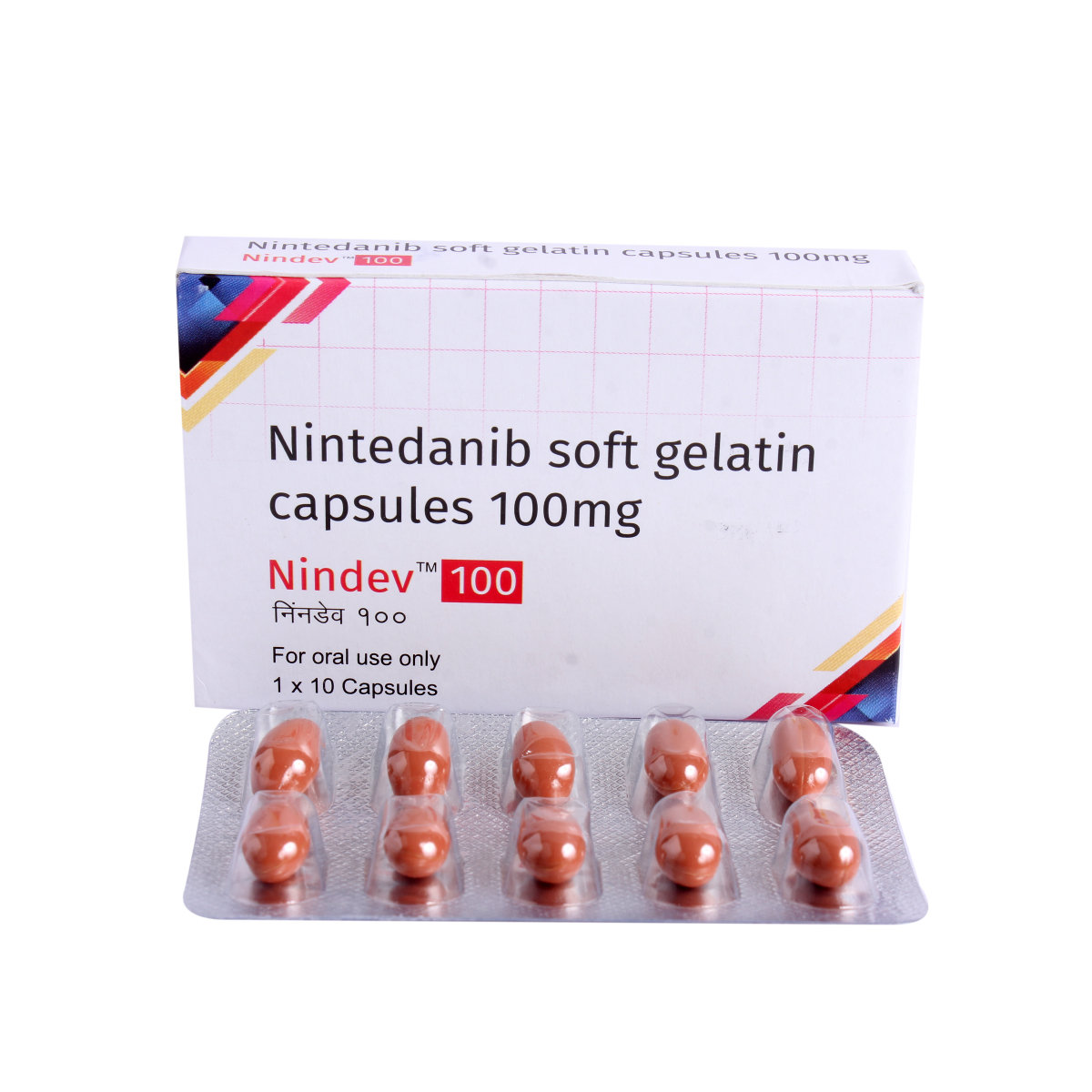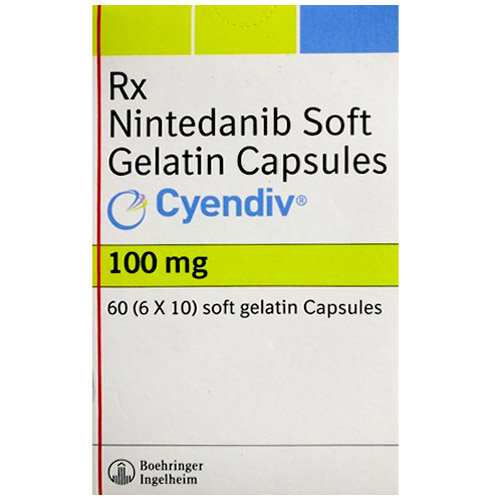- Home
- Nintenib 100 Softgel Capsule
Nintenib 100 Softgel Capsule Substitute
Nintenib 100 Softgel Capsule Substitute
Medicine Composition:
NINTEDANIB-100MGAll Substitutes & Brand Comparisons
RX
Nintib 100 Capsule 30's
Cipla Ltd
₹78
(₹2.34 per unit)
96% CHEAPERRX
Prutis 100 Softgel Capsule 10's
Hetero Drugs Ltd
₹609
(₹54.81 per unit)
27% CHEAPERRX
Out of StockMacdanib 100 Softgel Capsule 10'S
Macleods Pharmaceuticals Ltd
₹690
(₹62.1 per unit)
17% CHEAPERRX
Mantedanib-100 Softgel Cap 10'S
Mankind Pharma Pvt Ltd
₹703
(₹63.27 per unit)
15% CHEAPERRX
Out of StockFibnib 100mg Soft Gelatin Capsule
Alkem Laboratories Ltd
₹750
(₹67.5 per unit)
10% CHEAPERRX
Out of StockFibronib 100 Capsule
₹750
(₹67.5 per unit)
10% CHEAPERRX
Bronchonib 100 mg Capsule 10's
BDR Pharmaceuticals Internationals Pvt Ltd
₹703
(₹70.3 per unit)
6% CHEAPERRX
Nintib 100 Soft Gelatin Capsule 10's
Cipla Ltd
₹782.5
(₹70.43 per unit)
6% CHEAPERRX
Fibnib 100 Softgel Capsule 10's
Alkem Laboratories Ltd
₹848
(₹76.32 per unit)
1% COSTLIERRX
Nintena 100 mg Soft Gelatin Capsule 10's
Sun Pharmaceutical Industries Ltd
₹848.5
(₹76.37 per unit)
1% COSTLIERRX
Out of StockNintecare 100 Softgel Capsule 10's
Alniche Life Sciences Pvt Ltd
₹850
(₹76.5 per unit)
1% COSTLIERRX
Nindanib 100 Soft Gelatin Capsule 10's
Glenmark Pharmaceuticals Ltd
₹923.5
(₹83.12 per unit)
10% COSTLIERRX
Idofnib 100 Capsule 10's
Lupin Ltd
₹981
(₹88.3 per unit)
17% COSTLIERRX
Nindev 100 mg Softgel Capsule 10's
Zydus Healthcare Ltd
₹991.5
(₹89.25 per unit)
18% COSTLIERRX
Out of StockCyendiv 100Mg 60 Capsule
Boehringer Ingelheim India Pvt Ltd
₹12992.5
(₹177.56 per unit)
136% COSTLIER

When Should You Consider Switching from Nintenib 100 Softgel Capsule ?
Patients may explore substitutes in the following scenarios:
- High monthly cost of Nintenib 100 Softgel Capsule
- Non-availability in local pharmacies
- Generic recommendation by a doctor
- Side effects or better tolerability with alternatives
What to Know Before Switching
Before you switch from Nintenib 100 Softgel Capsule to another medicine, here are some important points to keep in mind:
Same salt, different brands:
Most substitutes contain the same active ingredient - NINTEDANIB-100MG, but the fillers, coating, or manufacturing quality may vary slightly.
Consult your doctor first:
Even if the salt is the same, your doctor can confirm if the substitute is right for your condition, dosage, and health history.
Watch out for allergies or reactions:
Some people may react differently to certain brands due to inactive ingredients. If you notice any side effects, inform your doctor immediately.
Price ≠ effectiveness:
A lower-priced substitute doesn't mean it's less effective. Many generic medicines work just as well as branded ones.
Check the dosage form and strength:
Always match the substitute’s strength (e.g., 5mg, 10mg) and form (tablet, capsule, syrup) with what your doctor prescribed.
Uses
Nintenib 100 Softgel Capsule is used in the treatment of Idiopathic pulmonary fibrosis. The detailed uses of Nintenib 100 Softgel Capsule are as follows: Treatment of Idiopathic pulmonary fibrosis
- Idiopathic pulmonary fibrosis: Nintenib 100 Softgel Capsule aids in the breakdown and thinning of mucus in the airways, facilitating coughing and removal. It is especially beneficial in conditions like Idiopathic pulmonary fibrosis.
Medicinal Benefits
- Nintenib 100 Softgel Capsule is an anti-fibrotic medicine used to treat idiopathic pulmonary fibrosis (IPF) in adults.
- Nintenib 100 Softgel Capsule can help effectively slow the rate of lung function decline by 50%.
- Nintenib 100 Softgel Capsule helps reduce the scarring and swelling in the lungs by decreasing the release/activity of naturally occurring growth factors in the body, allowing you to breathe better.
- Nintenib 100 Softgel Capsule helps in slowing down the progress of idiopathic pulmonary fibrosis.
FAQs
The substitutes of Nintenib 100 Softgel Capsule contain the same active salt(s) - NINTEDANIB-100MG. However, they may differ in price, manufacturing quality, and inactive ingredients. Speak to your doctor to find a suitable option.
Switching to a generic substitute medicine in the place of Nintenib 100 Softgel Capsule is often possible if it has the same salt, strength, and dosage form. But always check with your doctor before making any changes to your medication.
Generics versions of Nintenib 100 Softgel Capsule are typically more affordable because they don’t include the original brand's research, development, and marketing costs. They contain the same active ingredient and are approved for safety and effectiveness.
Most people don’t notice any difference. However, some may react to different fillers or coatings. If you notice any unusual symptoms after switching, consult your doctor.
Make sure the new medicine has the same active salt, strength, dosage form. Always confirm the change with your doctor or pharmacist.
Substitutes of Nintenib 100 Softgel Capsule meet the same safety and efficacy standards as Nintenib 100 Softgel Capsule , but small differences in absorption or formulation can exist. A doctor can help you choose the right one for your needs.
Yes. Substitutes of Nintenib 100 Softgel Capsule may vary in color, size, or shape due to differences in manufacturing and branding, but this does not affect how they work.
Yes, it’s generally safe to switch between multiple substitutes of Nintenib 100 Softgel Capsule if they have the same salt and strength. However, always inform your doctor so they can monitor how your body responds.
Yes, many people safely use substitutes of Nintenib 100 Softgel Capsule for long-term treatment. Just ensure it’s done under medical supervision.
If your symptoms stay under control or lab results remain stable, the substitute for Nintenib 100 Softgel Capsule is likely working well. Regular follow-ups with your doctor are important.
Absolutely. Even with the same salt, small differences can affect how your body responds when switching from Nintenib 100 Softgel Capsule to its substitute. Always consult your doctor before switching.
Nintenib 100 Softgel Capsule is used to treat idiopathic pulmonary fibrosis (IPF), a disease marked by a progressive decline in lung function.
Nintenib 100 Softgel Capsule helps reduce the scarring and swelling in the lungs by decreasing the release/activity of naturally occurring growth factors in the body, thereby helping you breathe better.
Avoid smoking before starting the treatment while taking Nintenib 100 Softgel Capsule as smoking might alter the effectiveness of Nintenib 100 Softgel Capsule .
Nintenib 100 Softgel Capsule should be stopped when a person faces a serious side effect that affects life quality. Otherwise, it would be best to keep taking Nintenib 100 Softgel Capsule until your doctor asks you to stop it.
If you have any surgery, including dental surgery, please inform your doctor if you are taking Nintenib 100 Softgel Capsule as your doctor might stop Nintenib 100 Softgel Capsule before undergoing surgery.
In elderly patients, the risk of side effects is higher if you are taking Nintenib 100 Softgel Capsule . For the patients who are elderly, dose adjustment might be required, or your doctor might prescribe any other medication safe for the elderly.
It is not recommended to discontinue the Nintenib 100 Softgel Capsule without consulting your healthcare provider. Abruptly stopping the medication can lead to disease progression or other complications. Consult your healthcare provider for personalised guidance if you have concerns or experience side effects.
If you forget to take a dose of Nintenib 100 Softgel Capsule , take it as soon as you remember. However, if it's almost time for your next dose, skip the missed dose and continue with your regular dosing schedule. Do not double up on doses to make up for the missed one, as this can increase the risk of side effects.
Common side effects of Nintenib 100 Softgel Capsule may include nausea, tiredness, diarrhoea, indigestion, loss of appetite, headache, and photosensitivity in some individuals. Most of these side effects do not require medical attention and will resolve gradually over time. However, if you experience these side effects persistently, inform your doctor.
Nintenib 100 Softgel Capsule is not recommended for use in patients with severe liver impairment. Please consult your doctor if you have a liver impairment or any concerns before Nintenib 100 Softgel Capsule .
Buy best Respiratory System products by
Cipla Ltd
Glenmark Pharmaceuticals Ltd
Lupin Ltd
Alkem Laboratories Ltd
Sun Pharmaceutical Industries Ltd
Mankind Pharma Pvt Ltd
Macleods Pharmaceuticals Ltd
Zydus Healthcare Ltd
Leeford Healthcare Ltd
Dr Reddy's Laboratories Ltd
Zydus Cadila
Pristine Pearl Pharma Pvt Ltd
Abbott India Ltd
Intas Pharmaceuticals Ltd
Alembic Pharmaceuticals Ltd
German Remedies Ltd
Centaur Pharmaceuticals Pvt Ltd
Aristo Pharmaceuticals Pvt Ltd
Zuventus Healthcare Ltd
Wockhardt Ltd
Koye Pharmaceuticals Pvt Ltd
Micro Labs Ltd
Ipca Laboratories Ltd
GlaxoSmithKline Pharmaceuticals Ltd
Med Manor Organics Pvt Ltd
Seagull Pharmaceutical Pvt Ltd
Torque Pharmaceuticals Pvt Ltd
Blue Cross Laboratories Pvt Ltd
Medishri Healthcare Pvt Ltd
Yash Pharma Laboratories Pvt Ltd
Capital Pharma
East West Pharma India Pvt Ltd
Fourrts India Laboratories Pvt Ltd
Indiabulls Pharmaceuticals Pvt Ltd
Tablets India Ltd
Uniza Healthcare Llp
Adonis Laboratories Pvt Ltd
Divine Savior Pvt Ltd
FDC Ltd
Shreya Life Sciences Pvt Ltd
Corona Remedies Pvt Ltd
Indoco Remedies Ltd
J B Chemicals & Pharmaceuticals Ltd
Unipark Biotech Pvt Ltd
Vasu Organics Pvt Ltd
Wings Pharmacuticals Pvt Ltd
Apex Laboratories Pvt Ltd
Best Biotech
Biological E Ltd
Skn Organics Pvt Ltd
Wanbury Ltd
Eysys Pharmaceutical Pvt Ltd
Healthgate Pvt Ltd
Icarus Health Care Pvt Ltd
Intra Life Pvt Ltd
Stedman Pharmaceuticals Pvt Ltd
Comed Chemicals Ltd
Entod Pharmaceuticals Ltd
Innoglide Pharmaceuticals Pvt Ltd
Lincoln Pharmaceuticals Ltd
Navil Laboratories Pvt Ltd
Precept Pharma
Stryker Pharma Pvt Ltd
Torrent Pharmaceuticals Ltd
Dolvis Bio Pharma Pvt Ltd
Elder Pharmaceuticals Ltd
Emcee Pharmaceuticals (P) Ltd
Geno Pharmaceuticals Pvt Ltd
La Renon Healthcare Pvt Ltd
Megma Healthcare Pvt Ltd
Pfizer Ltd
Prevego Healthcare & Research Pvt Ltd
Zee Laboratories Ltd
Balin Healthcare Pvt Ltd
Brinton Pharmaceuticals Ltd
Embiotic Laboratories (P) Ltd
Incite Pharmaceuticals
Kepler Healthcare Pvt Ltd
Modi Mundipharma Pvt Ltd
Sanatra Healthcare Ltd
Timon Pharmaceuticals Pvt Ltd
Wellok Pharma
Aar Ess Remedies Pvt Ltd
Bacans Biotech Pvt Ltd
Chemo Healthcare Pvt Ltd
Foregen Healthcare Ltd
Knoll Pharmaceuticals Ltd
RPG Life Sciences Ltd
Rnd Laboratories Pvt Ltd
Silver Cross Medisciences Pvt Ltd
Steris Healthcare
Thuyam Life Pvt Ltd
Votary Laboratories (India) Ltd
Yuventis Pharmaceuticals
Aglowmed Pharmaceuticals Ltd
Alienist Pharmaceutical Pvt Ltd
Alniche Life Sciences Pvt Ltd
Astra Zeneca Pharma India Ltd
Astrum Healthcare Pvt Ltd
Bio Warriors Pharmaceucticals Pvt Ltd



